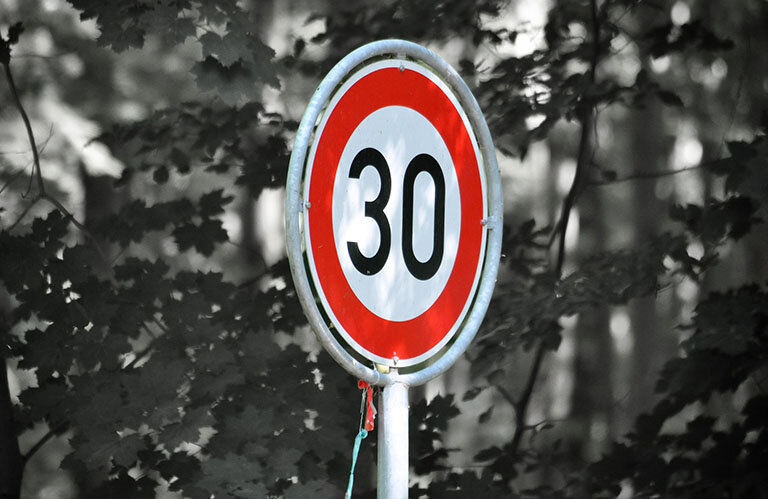
Speed Limits:
Improving Public & Environmental Health
Sadly this week Dublin City Council rejected the an amendment, which would have seen 30kph speed limits introduced across the city – a proposal that was submitted on both safety and environmental grounds.
Today we look at the role that speed limits can play in helping Ireland to tackle climate change, while also looking at the implications for road safety.
Reducing emissions
Introducing a speed limit of 30kph in urban and residential areas is nothing new, with active trials having been implemented across Europe since the mid-1990s.
Evaluations in the UK and Sweden found that a 30kph speed limit resulted in substantial reductions in harmful Nitrogen Oxide (NOx) and particulates in diesel vehicles – which account for more than 60% of the vehicles on the road in Ireland.
With one in eight deaths in Europe now directly linked to climate change, and internal combustion engine vehicles accountable for 25% of all emissions worldwide, even small savings on a local scale could have a big impact overall.
As such, this is not only an approach that should have been implemented in Dublin, but something that should be rolled out across urban and residential areas across Ireland.
Furthermore, the Green Party has proposed lowering motorway speed limits from 120kph to 110kph.
While this might seem like a small change, studies by the European Environment Agency concluded that this could result in a 12% drop in fuel consumption for diesel cars, 18% for petrol cars, and considerably greater savings for larger vehicles like delivery trucks – while also reducing NOx by around 16%, as well as lowering particulate matter and harmful hydrocarbons that are linked to air pollution-related illnesses and climate change.
“Lowering motorway speed limits from 120kph to 110kph could result in a 12% drop in fuel consumption for diesel cars and 18% for petrol cars”
If this is not enough of an incentive, the financial benefits of fuel saving should be incentive enough for those in the logistics industry.
While the introduction of lower motorway speed limits would need to be enforced – something that is already a challenge with current speed limits – and would likely add an average of 8-9 minutes to a 200km trip, the financial, ecological and public health benefits mean that this is a no-brainer.
Map of Dublin noise pollution. Credit: Dublin City Council
Health benefits of speed limits
According to 2009 research by the UK Noise Association, the introduction of a 30kph speed limit could reduce traffic noise by as much as 40%.
While we often overlook noise pollution, its impact for those living in an urban environment is considerable, and the introduction of reduced speed limits can offer major quality of life and health benefits.
The consequences of urban traffic noise are considerably more far-reaching than you may have previously though, and have been linked with increased anxiety, depression, high blood pressure, heart disease and strokes. Furthermore, these health impacts are believed to be considerably worse in children than they are in adults.
A 2016 study by the National Institute of Environmental Health Sciences, found that people living in areas with higher levels of traffic noise were 25% more likely to have symptoms of depression than those living in quieter neighbourhoods.
Not only could this improve people’s quality of life, it could also save the Irish State a considerably amount of money. According to the World Health Organization and the OECD, the financial cost of poor mental health already exceeded 4% of the EU’s GDP in 2016.
Impact on road safety
While IrishEVs.com promotes the adoption of zero-emissions battery electric vehicles, we know that cars aren’t the answer to tackling climate change.
The way forward lies in lies in better public transport, improved urban design for pedestrians and cyclists to make cities more accessible, and to promote localised consumption to reduce the carbon footprint of the produces that we consume – as well as dramatically reducing the amount we consume.
Research by the Transport Research Laboratory has shown that for urban roads with low average speeds, there is an average 6% reduction in collisions with each 1mph (1.6kph) reduction in average speed. As such, with Dublin looking to reduce its average by 20kph across the city, this study would suggest a potential 75% reduction in collisions for vulnerable road users like cyclists and pedestrians.
This doesn’t just affect the changes of being hit by a car, but also increases your chances of survival – the risk of being killed is almost five times higher in collisions between a car and a pedestrian at 50kph compared to the same type of collision at 30kph, according to the International Transport Forum.
Graph demonstrating likelihood of injury or death based on car speed limits. Credit: International Association of Traffic and Safety Sciences
If such speed limits were implemented, alongside awareness campaigns on engine idling and a ban on SUVs – vehicles that are nearly twice as likely to result in the death of pedestrians in a collision – the job to encourage more people to cycle and adopt sustainable transport would be considerably easier.
Implementing these limits will cost little – only the amount to change the road-side signage – but could bring a raft of environmental and public health benefits.
How hard would it be to implement? I believe Cllr Caroline Conroy put it best: “Just take your foot off the pedal”.
What To Read Next
How EVs Can Save Lives
Find out how EVs can reduce emissions to lower air pollution in Ireland, and how the switch to electric cars can save over 500,000 lives across the EU each year
Pollution Exposure Rises While Driving With Open Windows
Driving with the windows open increases your exposure to harmful emissions by more than 90% according to new University of Surrey research





